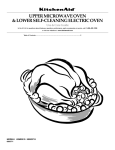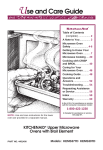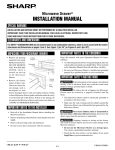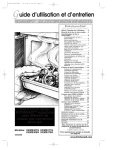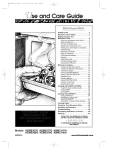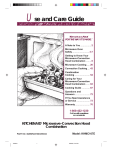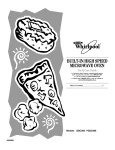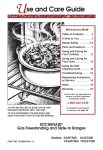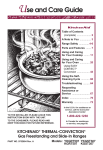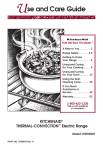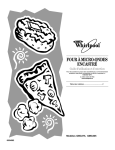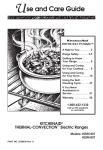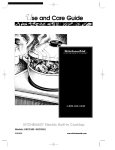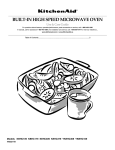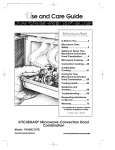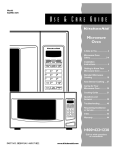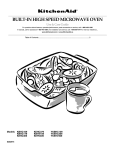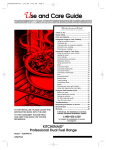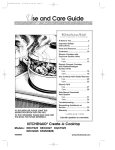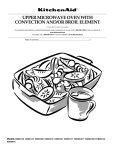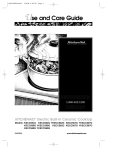Download KitchenAid KEMI301G User's Manual
Transcript
4452303v10c103 8/13/98 5:28 PM Page 1 Use and Care Guide A Note to You ...................................2 Microwave Oven Safety ..................3 Electric Oven Safety........................6 Getting to Know Your Microwave Oven ..............................8 Parts & Features .......................10 Microwave Cooking.......................14 Using CUSTOM REHEAT ........17 Using CUSTOM DEFROST .....19 Using CUSTOM COOK ............22 Using Code Pads ......................25 Microwave Cooking Guide...........27 Caring for Your Microwave Oven ............................31 Questions and Answers ...............32 Microwave Oven Troubleshooting ............................33 Getting to Know Your Electric Oven..................................34 Parts and Features....................34 Using Your Electric Oven .............35 Baking or Roasting....................39 Broiling.......................................43 Timed Cooking ..........................45 Using the Self-Cleaning Cycle.....48 Caring for Your Electric Oven......51 Electric Oven Troubleshooting....54 Requesting Assistance or Service...................55 Warranty..........................................56 1-800-422-1230 Call our Consumer Assistance Center with questions or comments. KITCHENAID® Upper Microwave Oven and Lower Self-Cleaning Electric Oven Models: KEMI301G KEMI371G 4452303 www.kitchenaid.com 4452303v10c103 8/13/98 5:28 PM Page 2 A Note to You Thank you for buying a KITCHENAID ® appliance! Because your life is getting busier and more complicated, KitchenAid® appliances are easy to use, save time, and help you manage your home better. To ensure that you enjoy many years of trouble-free operation, we developed this Use and Care Guide. It contains valuable information concerning how to operate and maintain your new appliance properly and safely. Please read it carefully. Also, please complete and mail the enclosed Product Registration Card. Please record your model’s information. Whenever you call our Consumer Assistance Center at 1-800-422-1230 or request service for your appliance, you need to know your complete model number and serial number. You can find this information on the model and serial number plate (see diagram on page 34 for location of plate). Please also record the purchase information. Model Number Serial Number Purchase/ Installation Date Builder/Dealer Name Address Phone NOTE: You must provide proof of purchase or installation date for in-warranty service. Keep this book and the sales slip together in a safe place for future reference. 2 4452303v10c103 8/13/98 5:28 PM Page 3 M icrowave Oven Safety Your safety and the safety of others is very important. We have provided many important safety messages in this manual and on your appliance. Always read and obey all safety messages. This is the safety alert symbol. This symbol alerts you to hazards that can kill or hurt you and others. All safety messages will be preceded by the safety alert symbol and the word “DANGER” or “WARNING.” These words mean: wDANGER You will be killed or seriously injured if you don’t follow instructions. wWARNING You can be killed or seriously injured if you don’t follow instructions. All safety messages will identify the hazard, tell you how to reduce the chance of injury, and tell you what can happen if the instructions are not followed. IMPORTANT SAFETY INSTRUCTIONS When using electrical appliances basic safety precautions should be followed, including the following: WARNING: To reduce the risk of burns, electric shock, fire, injury to persons, or exposure to excessive microwave energy: • Read all instructions before using the microwave oven. • Read and follow the specific “PRECAUTIONS TO AVOID POSSIBLE EXPOSURE TO EXCESSIVE MICROWAVE ENERGY” found in this section. • The microwave oven must be grounded. Connect only to properly grounded outlet. See “GROUNDING INSTRUCTIONS” found in the “Installation Instructions” section and on page 5 of this manual. • Install or locate the microwave oven only in accordance with the provided Installation Instructions. • Some products such as whole eggs in the shell and sealed containers – for example, closed glass jars – may explode and should not be heated in the microwave oven. • Use the microwave oven only for its intended use as described in this manual. Do not use corrosive chemicals or vapors in the microwave oven. This type of oven is specifically designed to heat, cook, or dry food. It is not designed for industrial or laboratory use. • As with any appliance, close supervision is necessary when used by children. – SAVE THESE INSTRUCTIONS – continued on next page 3 4452303v10c103 8/13/98 5:28 PM Page 4 M icrowave Oven Safety IMPORTANT SAFETY INSTRUCTIONS • The microwave oven should be serviced only by qualified service personnel. Call an authorized service company for examination, repair, or adjustment. • Do not cover or block any openings on the microwave oven. • See door surface cleaning instructions in the “Caring for Your Microwave Oven” section. • To reduce the risk of fire in the oven cavity: – Do not overcook food. Carefully attend the microwave oven if paper, plastic, or other combustible materials are placed inside the oven to facilitate cooking. – Remove wire twist-ties from paper or plastic bags before placing bags in oven. – If materials inside the oven should ignite, keep oven door closed, turn oven off, and disconnect the power cord, or shut off power at the fuse or circuit breaker panel. – Do not use the cavity for storage purposes. Do not leave paper products, cooking utensils, or food in the cavity when not in use. – SAVE THESE INSTRUCTIONS – PRECAUTIONS TO AVOID POSSIBLE EXPOSURE TO EXCESSIVE MICROWAVE ENERGY... (a) Do not attempt to operate this oven with the door open since open-door operation can result in harmful exposure to microwave energy. It is important not to defeat or tamper with the safety interlocks. (b) Do not place any object between the oven front face and the door or allow soil or cleaner residue to accumulate on sealing surfaces. 4 (c) Do not operate the oven if it is damaged. It is particularly important that the oven door close properly and that there is no damage to the: (1) Door (bent), (2) Hinges and latches (broken or loosened), (3) Door seals and sealing surfaces. (d) The oven should not be adjusted or repaired by anyone except properly qualified service personnel. 4452303v10c103 8/13/98 5:28 PM Page 5 M icrowave Oven Safety GROUNDING INSTRUCTIONS For all cord connected appliances: The microwave oven must be grounded. In the event of an electrical short circuit, grounding reduces the risk of electric shock by providing an escape wire for the electric current. The microwave oven is equipped with a cord having a grounding wire with a grounding plug. The plug must be plugged into an outlet that is properly installed and grounded. WARNING: Improper use of the grounding can result in a risk of electric shock. Consult a qualified electrician or serviceman if the grounding instructions are not completely understood, or if doubt exists as to whether the microwave oven is properly grounded. Do not use an extension cord. If the power supply cord is too short, have a qualified electrician or serviceman install an outlet near the microwave oven. For a permanently connected appliance: This appliance must be connected to a grounded, metallic, permanent wiring system, or an equipment grounding conductor should be run with the circuit conductors and connected to the equipment grounding terminal or lead on the appliance. 5 4452303v10c103 8/13/98 5:28 PM Page 6 E lectric Oven Safety Your safety and the safety of others is very important. We have provided many important safety messages in this manual and on your appliance. Always read and obey all safety messages. This is the safety alert symbol. This symbol alerts you to hazards that can kill or hurt you and others. All safety messages will be preceded by the safety alert symbol and the word “DANGER” or “WARNING.” These words mean: wDANGER You will be killed or seriously injured if you don’t follow instructions. wWARNING You can be killed or seriously injured if you don’t follow instructions. All safety messages will identify the hazard, tell you how to reduce the chance of injury, and tell you what can happen if the instructions are not followed. IMPORTANT SAFETY INSTRUCTIONS WARNING: To reduce the risk of fire, electrical shock, injury to persons, or damage when using the oven, follow basic precautions, including the following: • Proper Installation – Be sure the oven is properly installed and grounded by a qualified technician. • Never Use the Oven for Warming or Heating the Room. • Do Not Leave Children Alone – Children should not be left alone or unattended in area where oven is in use. They should never be allowed to sit or stand on any part of the oven. • Wear Proper Apparel – Loose-fitting or hanging garments should never be worn while using the oven. • User Servicing – Do not repair or replace any part of the oven unless specifically recommended in the manual. All other servicing should be referred to a qualified technician. • Storage in Oven – Flammable materials should not be stored in an oven. • Do Not Use Water on Grease Fires – Smother fire or flame or use dry chemical or foam-type extinguisher. • Use Only Dry Potholders – Moist or damp potholders on hot surfaces may result in burns from steam. Do not let potholder touch hot heating elements. Do not use a towel or other bulky cloth. • Use Care When Opening Door – Let hot air or steam escape before removing or replacing food. • Do Not Heat Unopened Food Containers – Build-up of pressure may cause container to burst and result in injury. • Keep Oven Vent Ducts Unobstructed. – SAVE THESE INSTRUCTIONS – 6 4452303v10c103 8/13/98 5:28 PM Page 7 E lectric Oven Safety IMPORTANT SAFETY INSTRUCTIONS • Placement of Oven Racks – Always place oven racks in desired location while oven is cool. If rack must be moved while oven is hot, do not let potholder contact hot heating element in oven. • DO NOT TOUCH HEATING ELEMENTS OR INTERIOR SURFACES OF OVEN – Heating elements may be hot even though they are dark in color. Interior surfaces of an oven become hot enough to cause burns. During and after use, do not touch, or let clothing or other flammable materials contact heating elements or interior surfaces of oven until they have had sufficient time to cool. Other surfaces of the oven may become hot enough to cause burns – among these surfaces are oven vent openings and surfaces near these openings, oven doors, and windows of oven doors. • Do Not Clean Door Gasket – The door gasket is essential for a good seal. Care should be taken not to rub, damage, or move the gasket. • Do Not Use Oven Cleaners – No commercial oven cleaner or oven liner protective coating of any kind should be used in or around any part of the oven. • Clean Only Parts Listed in Manual. • Before Self-Cleaning the Oven – Remove broiler pan and other utensils. – SAVE THESE INSTRUCTIONS – 7 4452303v10c103 8/13/98 5:28 PM Page 8 Getting to Know Your Microwave Oven This section discusses the concepts behind microwave cooking. It also shows you the basics you need to know to operate your microwave oven. Please read this information before you use your oven. How your microwave oven works Microwave ovens are safe. Microwave energy is not hot. It causes food to make its own heat, and it's this heat that cooks the food. Microwaves are like TV waves, radio waves or light waves. You cannot see them, but you can see what they do. A magnetron in the microwave oven produces microwaves. The microwaves move into the oven where they contact food as it turns on the turntable. The glass turntable of your microwave oven lets microwaves pass through. Then they bounce off a metal floor, back through the glass turntable, and are absorbed by the food. Magnetron Metal floor Oven cavity Glass turntable Microwaves pass through most glass, paper, and plastics without heating them so food absorbs the energy. Microwaves bounce off metal containers so food does not absorb the energy. The microwaves disturb water molecules in the food. As the molecules bounce around bumping into each other, heat is made, like rubbing your hands together. This is the heat that does the cooking. 8 Radio interference Using your microwave oven may cause interference to your radio, TV, or similar equipment. When there is interference, you can reduce it or remove it by: • Cleaning the door and sealing surfaces of the oven. • Adjusting the receiving antenna of the radio or television. • Moving the receiver away from the microwave oven. For the best cooking results • Always cook food for the shortest cooking time recommended. Check to see how the food is cooking. If needed, touch EASY MINUTE while the oven is operating or after the cooking cycle is over (see the “Using EASY MINUTE” section). • Stir, turn over, or rearrange the food being cooked about halfway through the cooking time for all recipes. This will help make sure the food is evenly cooked. NOTE: Some cycles may have to be reset if you have interrupted the cycle. • If you do not have a cover for a dish, use wax paper, or microwave-approved paper towels or plastic wrap. Turn back a corner of the plastic wrap to vent steam during cooking. Testing your microwave oven To test the oven put about 1 cup of cold water in a glass container in the oven. Close the door. Make sure it latches. Cook at 100% power for 2 minutes. When the time is up, the water should be heated. 4452303v10c103 8/13/98 5:28 PM Page 9 G etting to Know Your Microwave Oven • For best results, stir any liquid several times during heating or reheating. Liquids heated in certain containers (especially containers shaped like cylinders) may become overheated. The liquid may Test dinnerware or cookware before using. splash out with a loud noise during or after To test a dish for safe use, put it into the oven heating or when adding ingredients (coffee with a cup of water beside it. Cook at 100% granules, tea bags, etc.). This can harm the cook power for one minute. If the dish gets oven and possibly injure someone. hot and water stays cool, do not use it. • Microwaves may not reach the center of a Some dishes (melamine, some ceramic roast. The heat spreads to the center from dinnerware, etc.) absorb microwave energy, the outer, cooked areas just as in regular becoming too hot to handle and slowing oven cooking. This is one of the reasons cooking times. Cooking in metal containers for letting some foods (for example, roasts not designed for microwave use could or baked potatoes) stand for a while after damage the oven, as could containers with cooking, or for stirring some foods during hidden metal (twist-ties, foil lining, staples, the cooking time. metallic glaze or trim). • Do not deep fry in the oven. Microwavable cookware is not suitable and it is difficult to maintain appropriate deep frying temperatures. • Do not overcook potatoes. Fire could • Never lean on the door or allow a child to result. At the end of the recommended swing on it when the door is open. Injury cooking time, potatoes should be slightly could result. firm because they will continue cooking • Use hot pads. Microwave energy does not during standing time. After microwaving, heat containers, but heat from the food can wrap potatoes in foil and set aside for 5 make the container hot. minutes. They will finish cooking while • Do not use newspaper or other printed standing. paper in the oven. Fire could result. • Do not operate the microwave oven • Do not dry flowers, fruit, herbs, wood, paper, unless the glass turntable is securely in gourds, or clothes in the oven. Fire could result. place and can rotate freely. The turntable • Do not start a microwave oven when it is can rotate in either direction. Make sure empty. Product life may be shortened. If the turntable is correct-side up in the oven. you practice programming the oven, put a Make sure support base is all the way on container of water in the oven. It is normal the shaft in oven cavity floor. Handle your for the oven door to look wavy after the turntable with care when removing it from oven has been running for a while. the oven to avoid possibly breaking it. If • Do not try to melt paraffin wax in the oven. your turntable cracks or breaks, contact Paraffin wax will not melt in a microwave your appliance dealer for a replacement. oven because it allows microwaves to pass through it. • When you use a browning dish, the browning dish bottom must be at least 3⁄16 inch above the turntable. Follow the directions supplied with the browning dish. Your microwave is connected to a 110-volt • Never cook or reheat a whole egg inside side of the 240-volt circuit required for the the shell. Steam buildup in whole eggs may lower oven. If the incoming voltage to the cause them to burst and burn you, and microwave is less than 110 volts, cooking possibly damage the oven. Slice hardtimes may be longer. Have a qualified electrician check your electrical system. boiled eggs before heating. In rare cases, poached eggs have been known to explode. Cover poached eggs and allow a standing 9 time of one minute before cutting into them. Testing your dinnerware or cookware Operating safety precautions Electrical connection 4452303v10c103 8/13/98 5:28 PM Page 10 G etting to Know Your Microwave Oven Microwave oven parts and features 9 8 7 5 6 2 1 3 Your microwave oven is designed to make your cooking experience as enjoyable and productive as possible. To help get you up and running quickly, the following is a list of the oven’s basic features: 1. Door Handle. 2. Window with Metal Shield. Shield prevents microwaves from escaping. It is designed as a screen to allow you to view food as it cooks. 3. Glass Turntable. This turntable turns food as it cooks for more even cooking. It must be in the oven during operation for best cooking results. 4. Removable Turntable Support (under turntable). 10 4 5. Cook Guide Label. 6. Light. Automatically turns on when door is opened or when oven is operating. 7. Microwave Oven Control Panel. Touch pads on this panel to perform all functions. 8. Door Safety Lock System. The oven will not operate unless the door is securely closed. 9. Lower Oven Control Panel. See Lower Oven Use and Care Section for more information. 4452303v10c103 8/13/98 5:28 PM Page 11 G etting to Know Your Microwave Oven Control panel features 1 1 2 3 4 5 6 7 8 9 12 SET START CANCEL 2 3 4 MICRO OVEN (3 SIZES) 0 TIMER PWR IN. OZ POPCORN QUANTITY CLOCK SET START ENTER TEMP COOK AUTO SENSOR DEFROST START ? P REHEAT TIMER HR 12 3 LBS MIN NO. SEC CONTROL LOCK OVEN LIGHT CUSTOM REHEAT CUSTOM DEFROST CUSTOM COOK MICRO 10 A-B START 9 MICROWAVE OVEN COOK POWER 5 EASYMINUTE CANCEL 6 Your microwave oven control panel lets you select the desired cooking function quickly and easily. The following is a list of all the Command and Number pads located on the control panel. You can also make cooking function choices by using Code pads. Code pads are Number pads used to select a cook power, food setting, or quantity. 1. Display. This display includes a clock and indicators to tell you the time of day, cooking time settings, cook powers, quantities, weights and cooking functions. 2. CLOCK SET•START. Touch this pad to enter the correct time of day. 3. TIMER CANCEL. Touch this pad to cancel the Minute Timer. 4. TIMER SET•START. Touch this pad followed by number pads to use as a kitchen timer 5. POPCORN. Touch this pad to pop popcorn in your microwave oven. The oven will automatically cook at a preset cook power and time. 6. CUSTOM REHEAT. Touch this pad to reheat food at a preset cook power and time. 7 8 11 7. CUSTOM DEFROST. Touch this pad to thaw frozen food by weight. 8. CUSTOM COOK. Touch this pad to cook foods at a preset cook power and time. 9. EASY MINUTE/START. Touch this pad to start a function you have set. You can also use it to cook for 1 minute at 100% cook power or to add an extra minute to your cooking cycle. 10A. MICRO. Touch this pad before entering a cooking time when setting a second or third cycle in multi-cycle cooking. 10B. COOK POWER. Touch this pad, after the cook time has been set, followed by a Number pad to set the amount of microwave energy released to cook the food. The higher the number, the higher the power wattage and the faster the “cooking speed.” 11. MICROWAVE OVEN CANCEL. Touch this pad to cancel a function. See next page for more information. 12. Number Pads. Touch Number pads to enter cooking times, cook powers, selection, quantities, or weights. continued on next page 11 4452303v10c103 8/13/98 5:28 PM Page 12 G etting to Know Your Microwave Oven NOTES: • If you touch one Command pad and then want to choose another Command pad in the same cycle, you must press CANCEL first. • If you attempt to enter unacceptable instructions three tones will sound. Touch CANCEL and re-enter the instructions. Audible signals Audible signals are available to guide you when setting and using your oven: • A programming tone will sound each time you touch a pad. • Four tones signal the end of a cooking cycle or the Minute Timer countdown. Choosing cooking function settings The cooking functions discussed in the “Getting to Know Your Microwave Oven” and “Microwave Cooking” sections use Command pads to choose cooking function settings. Another way to choose cooking function settings is by using Code pads. Code pads are Number pads used to select a cook power, food settings, or quantities. Food setting charts found in the “Using CUSTOM REHEAT,” “Using CUSTOM DEFROST,” and “Using CUSTOM COOK” sections list only Code pads for food settings. The charts in “Using code pads” in the “Microwave Cooking” section list all the available Code pads. Setting the clock When your microwave oven is first plugged in or after a power failure, the colon and time of day will flash for 5 minutes. “PF” will show on the lower oven Temperature Display until any pad is touched. NOTES: • You can only set the clock when the lower oven and the microwave oven are not cooking food and when the Minute Timer is not counting down. • You can clear the time of day from the Display by touching and holding CLOCK SET•START for 5 seconds. Touch CLOCK SET•START to see the time of day again. To set time: 1. Choose the clock. TOUCH CLOCK SET START 2. Enter time of day. Example for 5:30: TOUCH 5 3 CONTROL LOCK Interrupting cooking You can stop the oven during a cycle by opening the door. The oven stops heating and the fan stops, but the light stays on. To restart cooking for all cycles, close the door and TOUCH 3. Complete entry. TOUCH CLOCK SET START EASYMINUTE START If you do not want to continue cooking: • Close the door and the light goes off AND • TOUCH MICROWAVE OVEN CANCEL 12 OR EASYMINUTE START 0 QUANTITY 4452303v10c103 8/13/98 5:28 PM Page 13 G etting to Know Your Microwave Oven Using the Minute Timer NOTE: You can use other Command pads while the Minute Timer is counting down. 1. Choose the Minute Timer. NOTE: The Timer does not start or stop the microwave oven. It works like a regular kitchen timer. It can be set in hours and minutes up to 99 hours and 59 minutes, or in minutes and seconds up to 99 minutes and 59 seconds. TOUCH TIMER SET START once for minutes and seconds OR twice for hours and minutes 2. Enter time to be counted down. Example for 10 minutes: TOUCH 1 0 QUANTITY 0 0 QUANTITY QUANTITY (display shows time counting down) 3. Start countdown. TOUCH TIMER SET START When countdown ends: Four tones will sound and repeat every minute until you touch the Timer Cancel pad. This will clear the Display. To cancel any time: TOUCH TIMER CANCEL Using EASY MINUTE EASY MINUTE lets you cook food for 1 minute at 100% cook power or add an extra minute to your cooking cycle. You can also use it to extend cooking time in multiples of 1 minute, up to 99 minutes. NOTES: • To extend cooking time in multiples of 1 minute, touch EASY MINUTE during cooking. • You can enter EASY MINUTE only after closing the door. • You can use EASY MINUTE with all timed cooking. • If the door has been opened during cooking, you can restart cooking by closing the door and touching EASY MINUTE/START. 1. Put the food in oven and close the door. 2. Choose setting. Example for one minute: TOUCH EASYMINUTE START once When cooking time ends: Four tones will sound and the display will show “End”. Four tones will repeat every minute until you open the oven door or touch CANCEL. This will clear the display. 13 4452303v10c103 8/13/98 5:28 PM Page 14 Microwave Cooking This section gives you instructions for operating each microwave function. Please read these instructions carefully. Cooking at high cook power 1. Put food in oven and close the door. 4. After cooking, open the door OR TOUCH MICROWAVE OVEN CANCEL 2. Set cooking time. Example for 1 minute, 30 seconds: TOUCH 1 3 CONTROL LOCK 0 QUANTITY NOTE: During setup, if you want to change the cooking time you have entered, you must touch four digits. For example, to change 1 minute and 30 seconds to 1 minute and 45 seconds, touch Number pads 0, 1, 4, and 5. 3. Start oven. TOUCH EASYMINUTE START NOTES: • If you want to add more time during cooking use EASY MINUTE. See “Using EASY MINUTE” in the “Getting to Know Your Microwave Oven” section for more information. • If you want to change the cooking time after cooking has started, touch MICRO and enter the new cooking time within 5 seconds. When cooking time ends: Four tones will sound, and the display will show “End”. 14 Four tones will repeat every minute until you open the oven door or touch CANCEL. This will clear the display. 4452303v10c103 8/13/98 5:28 PM Page 15 M icrowave Cooking Cooking at different cook powers For best results, some recipes call for different cook powers. The lower the cook power, the slower the cooking. Each Number pad also stands for a different percentage of cook power. Many microwave cookbook recipes tell you by number, percent, or name which cook power to use. The following chart gives the percentage of cook power each Number pad stands for, and the cook power name usually used. It also tells you when to use each cook power. Follow recipe or food package instructions if available. NOTE: Refer to a reliable cookbook for cooking times COOK POWER NAME WHEN TO USE IT 10=100% of full power High • Quick heating many convenience foods and foods with high water content, such as soups and beverages • Cooking small tender pieces of meat, ground meat, poultry pieces, fish fillets, and vegetables 9=90% of full power • Heating cream soups 8=80% of full power • Heating rice, pasta, or casseroles 7=70% of full power Medium-High 6=60% of full power 5=50% of full power • Cooking sensitive foods such as cheese and egg dishes, pudding, and custards • Cooking non-stirrable casseroles, such as lasagna Medium 4=40% of full power 3=30% of full power • Cooking ham, whole poultry, and pot roasts • Melting chocolate • Simmering stews • Heating pastries Medium-Low, Defrost 2=20% of full power 1=10% of full power • Cooking and heating foods that need a cook power lower than high (for example, whole fish and meat loaf) or when food is cooking too fast • Reheating a single serving of food • Defrosting foods, such as bread, fish, meats, poultry, and precooked foods • Softening butter, cheese, and ice cream Low • Keeping food warm • Taking chill out of fruit NOTE: For information on which cook powers and cooking times you need for specific foods, see the “Microwave cooking chart” in the “Cooking Guide” section. continued on next page 15 4452303v10c103 8/13/98 5:28 PM Page 16 M icrowave Cooking 1. Put food in oven and close the door. 2. Set cooking time. Example for 10 minutes, 30 seconds: 5. After cooking, open the door OR TOUCH MICROWAVE OVEN TOUCH 1 CANCEL 0 QUANTITY 0 3 CONTROL LOCK Four tones will repeat every minute until you open the oven door or touch CANCEL. This will clear the display. QUANTITY Cooking in stages 3. Set cook power. Example for 50% cook power: TOUCH MICRO then COOK POWER 5 NOTE: During setup, if you want to change the cooking time after setting the cook power, wait for TIME to reappear on the display, then enter the new cooking time. For best results, some recipes call for one cook power for a certain length of time, and another cook power for another length of time. Your oven can be set to change from one to another automatically. 1. Put food in oven and close the door. 2. Set cooking time for first cycle. Example for 7 minutes, 30 seconds: TOUCH 4. Start oven. 7 3 CONTROL LOCK TOUCH 0 QUANTITY EASYMINUTE START (display counts down time) NOTES: • If you want to add more time during cooking use EASY MINUTE. See “Using EASY MINUTE” in the “Getting to Know Your Microwave Oven” section for more information. • If you want to change cooking time after cooking has started, touch MICRO and enter the new cooking time within 5 seconds. When cooking time ends: Four tones will sound, and the display will show “End”. 16 3. Set cook power for first cycle (optional). If you want to cook at full (100%) cook power, go to Step 5. Example for 50% cook power: then TOUCH MICRO COOK POWER 5 NOTE: During setup, if you want to change the cooking time after setting the cook power, wait for TIME to reappear on the display, then enter the new cooking time. 4452303v10c103 8/13/98 5:28 PM Page 17 M icrowave Cooking 4. When display says “TIME,” touch MICRO to set second cycle. TOUCH MICRO COOK POWER 5. Set cooking time for second cycle. Example for 3 minutes, 25 seconds: TOUCH 2 3 9. After cooking, open the door 6. Set cook power for second cycle (optional). If you want to cook at full (100%) cook power, go to Step 8. Example for 60% cook power: MICRO COOK POWER When cooking time ends: Four tones will sound, and the display will show “End”. 5 CONTROL LOCK TOUCH NOTES: • If you want to add more time during cooking use EASY MINUTE. See “Using EASY MINUTE” in the “Getting to Know Your Microwave Oven” section for more information. • During any Micro cooking stage, you can change the cooking time after touching START. Simply touch MICRO and enter the new cooking time within 5 seconds. then 6 OR TOUCH MICROWAVE OVEN CANCEL Four tones will repeat every minute until you open the oven door or touch CANCEL. This will clear the display. Using CUSTOM REHEAT 7. Repeat Steps 4 to 6 above for third cycle (optional). Your microwave oven automatically reheats food. You do not have to enter times or temperatures. 8. Start oven. NOTE: If you want to manually reheat using a cook time and cook power see “Reheating chart” in the “Cooking Guide” section. TOUCH EASYMINUTE START (display counts down cooking time in each cycle, starting with first cycle) One short tone will sound between cycles. Summary of steps for setting CUSTOM REHEAT 1. Touch CUSTOM REHEAT. 2. Touch CUSTOM REHEAT again to scan and select reheat food settings. 3. Touch QUANTITY to scan and select available quantity settings. continued on next page 17 4452303v10c103 8/13/98 5:28 PM Page 18 M icrowave Cooking Custom reheat chart 4. Enter food quantity. FOOD SETTING QUANTITY 1 2 3 4 5 6 7 Dinner Plate Bread Meats Cheese Dip Soups Sauce Pizza 1 1 1 1 1 1 1 8 Beverage SERVING TEMPERATURE Warm Hot Very Hot CODE • Coffee • Tea • Hot Chocolate to to to to to to to 2 6 6 3 4 3 2 servings slices servings cups cups cups servings 1. Put food in oven and close door. 2. Touch CUSTOM REHEAT. TOUCH Example for 2 servings: TOUCH 0 QUANTITY twice TOUCH EASYMINUTE START Touch START or wait 5 seconds for oven to start automatically. The remaining time will count down. If you have chosen any of settings 4, 5, or 6, four tones will sound in the middle of the cycle and the display will show “STIR” for 5 seconds. You can then stir food if desired. To restart the cycle you must close the door and touch START. When reheating time ends: Four tones will sound, and the display will show “End”. 5. After reheating, open the door 3. Choose food setting. Keep touching CUSTOM REHEAT until the food that you are cooking appears on the display. Example for Dinner Plate (Setting 1): TOUCH OR TOUCH MICROWAVE OVEN CANCEL Four tones will repeat every minute until you open the oven door or touch CANCEL. This will clear the display. once Heating a beverage (Setting 8) NOTES: • To choose the desired food code, see the Cooking Guide Label on the front frame of the oven or the “Custom reheat chart” earlier in this section. • You can disable or enable the Quantity pad prompt. See the “Using help prompts” section for more information. 18 1. Place beverage in oven and close door. 2. Touch CUSTOM REHEAT. TOUCH 4452303v10c103 8/13/98 5:28 PM Page 19 M icrowave Cooking Serving temperatures: 3. Choose beverage setting. Keep touching CUSTOM REHEAT until “BEVRG” appears on the display. TOUCH eight times Touch CUSTOM REHEAT until the type of beverage you want appears on the display. TOUCH three times Example for Hot Chocolate: BEVERAGE TOUCH CUSTOM REHEAT Coffee once Tea twice Hot Chocolate three times 5. Enter serving temperature. Keep touching CUSTOM REHEAT until the temperature you want shows on the display. Example for Hot: twice Warm once Hot twice Very Hot three times TOUCH 4. Enter type of beverage. TOUCH TOUCH CUSTOM SERVING TEMPERATURE REHEAT EASYMINUTE START Touch START or wait 5 seconds for oven to start automatically. The heating time will count down. NOTE: Liquid may splash out during or after heating while stirring or adding ingredients such as coffee granules, tea bags, etc. (See “Operating safety precautions” in the “Getting to Know Your Microwave Oven” section for more information.) When heating time ends: Four tones will sound, and the display will show “End”. 6. After heating, open the door OR TOUCH MICROWAVE OVEN CANCEL Four tones will repeat every minute until you open the oven door or touch CANCEL. This will clear the display. Using CUSTOM DEFROST Your microwave oven uses a preset defrost time and power according to the food setting and the food quantity that you choose. NOTE: Standing time is included in the defrosting time selected by your microwave oven. This may make defrosting times seem longer than in other microwave ovens. (See “Defrosting tips” later in this section for more information.) continued on next page 19 4452303v10c103 8/13/98 5:28 PM Page 20 M icrowave Cooking Summary of steps for setting CUSTOM DEFROST 1. Touch CUSTOM DEFROST. 2. Touch CUSTOM DEFROST again to scan and select food settings. 3. Enter weight or touch QUANTITY to select quantity. Custom defrost chart FOOD SETTING WEIGHT OR QUANTITY 1 Meats 0.10 lb (1 oz) to 6.60 lbs (6 lbs, 8 oz) 2 Chicken/Poultry 0.10 lb (1 oz) to 6.60 lbs (6 lbs, 8 oz) 3 Fish/Seafood 0.10 lb (1 oz) to 4.40 lbs (4 lbs, 6 oz) 4 Bagel 1 to 6 5 Fruit Juice 6, 12, or 16 oz 6 Roll/Muffin 1 to 6 CODE NOTE: Bagel quantity settings 1 and 2 may appear to have longer defrost times than necessary. However, longer times use less cook power. 1. Put food in oven and close door. 4. Enter food weight. Example for 1.25 lbs: TOUCH 2. Touch CUSTOM DEFROST. TOUCH CUSTOM DEFROST 3. Choose food setting. Keep touching CUSTOM DEFROST until the food that you are cooking appears on the display. Example for Meats (Setting 1): TOUCH CUSTOM DEFROST once NOTE: To choose the desired food setting, see the Cooking Guide Label on the front frame of the oven, the “Custom defrost chart” earlier in this section, or scan through the settings by pressing the Quantity pad (once for each setting). 20 1 2 5 NOTES: • Use Number pads for settings 1 to 3. Use the Quantity pad for settings 4 to 6. • If you enter a weight greater than the maximum weight listed in the “Custom defrost chart” earlier in this section, “RETRY” shows on the display. • See the “Weight conversion chart” later in this section for help in converting food weight to decimals. • See the “Custom defrost chart” earlier in this section for weight ranges available for each food category. • Each time you touch the Quantity pad to select a cooking weight for settings 1-3, the display increases by a quarter pound. For settings 4 to 6 the display changes to the next higher quantity/ weight. 4452303v10c103 8/13/98 5:28 PM Page 21 M icrowave Cooking When defrosting time ends: Four tones will sound, and the display will show “End”. TOUCH EASYMINUTE START Touch START or wait 5 seconds for oven to start automatically. The remaining time will count down. If you have chosen any of settings 1, 2, or 3, four tones will sound in the middle of the cycle and the display will show “TURN” for 5 seconds. You can then turn food if desired. To restart the cycle you must close the door and touch START. 5. After defrosting, open the door OR TOUCH MICROWAVE OVEN CANCEL Four tones will repeat every minute until you open the oven door or touch CANCEL. This will clear the display. Weight conversion chart You are probably used to food weights as being in pounds and ounces that are fractions of a pound (for example, 4 ounces equals 1⁄4 pound). However, in order to enter food weight in CUSTOM DEFROST, you must specify pounds and tenths of a pound. If the weight on the food package is in fractions of a pound, you can use the following chart to convert the weight to decimals. OUNCES WEIGHT 1.6 3.2 4.0 4.8 6.4 8.0 9.6 11.2 12.0 12.8 14.4 16.0 DECIMAL WEIGHT .10 .20 .25 .30 .40 .50 .60 .70 .75 .80 .90 1.00 Defrosting tips • When using CUSTOM DEFROST, the weight to be entered is the net weight in pounds, and tenths of pounds (the weight of the food minus the container). • CUSTOM DEFROST gives best results when food to be thawed is a minimum of 0°F or colder. POUND WEIGHT One-Quarter Pound One-Half Pound Three-Quarters Pound One Pound • If the food is kept outside the freezer for more than 20 minutes, and for defrosting ready-made food, defrost by time and power and let stand after defrosting. • The shape of the package affects how quickly food will defrost. Shallow packages will defrost more quickly than a deep block. • As food begins to defrost, separate the pieces. Separated pieces defrost more evenly. continued on next page 21 4452303v10c103 8/13/98 5:28 PM Page 22 M icrowave Cooking • Use small pieces of aluminum foil to shield parts of food such as chicken wings, leg tips, fish tails, or areas that start to get warm. Make sure the foil does not touch the sides, top, or bottom of the oven. The foil can damage the oven lining. • For better results, a preset standing time is included in the defrosting time. This may make the defrosting time seem longer than expected. Popping popcorn POPCORN lets you pop commercially packaged microwave popcorn by touching just one pad. Pop only one package at a time. Try several brands to decide which gives best popping results. For best results, use fresh bags of popcorn. Cooking performance may vary with brand and fat content. If you are using a microwave popcorn popper, follow manufacturer’s instructions. NOTE: If you want to add more time during or after popping, use EASY MINUTE. IMPORTANT: Never leave microwave unattended when adding more popping time than recommended by the automatic cycle. 1. Place bag in center of turntable and close door. 2. Touch POPCORN. TOUCH TOUCH EASYMINUTE START Touch START or wait 5 seconds for the oven to start automatically. The popping time will count down. When popping time ends: Four tones will sound. 4. After popping popcorn, open the door OR TOUCH MICROWAVE OVEN CANCEL Four tones will repeat every minute until you open the oven door or touch CANCEL. This will clear the display. Using CUSTOM COOK Cooking with CUSTOM COOK lets you cook food without needing to set times and cook powers. CUSTOM COOK has preset times and cook powers (see the “Custom cook chart”). NOTE: When cooking with cook time and cook power, see the “Microwave cooking chart” in the “Cooking Guide” section. POPCORN (3 SIZES) once The microwave oven will automatically pop a 3.5 oz bag of popcorn when you touch POPCORN. If you want to pop a different size bag of popcorn, follow the chart below: 22 3. Start oven. SIZE OF BAG TOUCH POPCORN PAD 3.5 oz once 3.0 oz twice 1.75 oz three times Summary of steps for setting CUSTOM COOK 1. Touch CUSTOM COOK. 2. Touch CUSTOM COOK again to scan and select food settings. 3. Touch QUANTITY to scan and select quantity settings. 4452303v10c103 8/13/98 5:28 PM Page 23 M icrowave Cooking Custom cook chart CODE FOOD QUANTITY PREPARATION 1 Frozen Entree 9 oz, 11 oz, 16 oz Follow package directions. 2 Casserole 2 cups, 4 cups, To reheat, flatten on plate or place in bowl. 6 cups, 8 cups Cover with lid or vented plastic wrap. Stir before serving. 3 Frozen Vegetables 1 to 4 cups Place in a microwave safe container. Cover with lid or plastic wrap. After cooking remove from oven, stir, cover, and let stand 3 minutes before serving. NOTE: When cooking a 10 oz package of frozen vegetables (this equals about 11⁄2 cups), touch Quantity pad once for 1 cup of “tender crisp” vegetables (you cannot enter 1⁄2-cup amounts) or touch Quantity pad twice for 2 cups of vegetables more fully cooked. 4 Bacon 2, 3, 4, or 6 strips Place on microwave safe container. Cover with paper towel. After cooking remove from oven carefully. 5 Fresh Vegetables 1 to 4 cups Place in a microwave-safe container. For beans, carrots, corn, and peas, add 1 tablespoon water per cup. For broccoli, brussels sprouts, cabbage, and cauliflower, cook immediately after washing with no additional water. If you like tender-crisp vegetables, set the Custom Cook quantity for half the amount of vegetables you are actually cooking. For example, when cooking 2 cups of vegetables, set QUANTITY for 1 cup. Cover with lid or plastic wrap. After cooking, remove from oven, stir, cover, and let stand 3 to 5 minutes before serving. 6 Frozen Burrito 1, 2, 3, or 4 Follow package directions. 7 Hot Dogs 1, 2, 4, or 6 Pierce hot dogs with a fork and place on a microwave safe container. Cover hot dogs with a paper towel. 8 Baked Potatoes 1 to 6 Before baking, remember to pierce potatoes with a fork several times. After cooking, wrap in foil and let potato stand 5 minutes. continued on next page 23 4452303v10c103 8/13/98 5:28 PM Page 24 M icrowave Cooking 1. Put food in oven and close door. 2. Touch CUSTOM COOK. TOUCH CUSTOM COOK 3. Choose food setting. Keep touching CUSTOM COOK until the food that you are cooking appears on the display. Example for Casseroles (Code 2): TOUCH Touch START or wait 5 seconds for oven to start automatically. The cooking time will count down. When cooking time ends: Four tones will sound, and the display will show “End”. 5. After cooking, open the door OR TOUCH MICROWAVE OVEN CANCEL Four tones will repeat every minute until you open the oven door or touch CANCEL. This will clear the display. CUSTOM COOK twice NOTES: • To choose the desired food setting, see the Cook Guide Label on the front frame of the oven or the “Custom cook chart” earlier in this section. • You can disable or enable the Quantity pad prompt. See “Using help prompts” in the “Cooking with CRISP and BROIL” section for more information. 4. Enter food size or weight. Example for 4 cups: TOUCH 0 QUANTITY twice TOUCH EASYMINUTE START 24 Keeping food warm You can safely keep hot, cooked food warm in your microwave oven for up to 99 minutes. 1. Put hot, cooked food in oven and close the door. 2. Set time (up to 99 minutes). 3. Set cook power at 10%. 4. Start oven. To program keep-warm at the end of a microwave cooking cycle, follow the instructions in the “Cooking in stages” section using 10% power up to 99 minutes as the last cycle. NOTES: • Food cooked covered should be covered when kept warm • Pastry items (pies, turnovers, etc.) should be uncovered when kept warm. • Complete meals should be covered when kept warm on a dinner plate. 4452303v10c103 8/13/98 5:28 PM Page 25 M icrowave Cooking COOK POWER Using code pads You can use Number pads as shortcuts when cooking with your microwave oven. For example, to reheat one cup of cheese dip: 1. Press the Reheat pad. 2. Choose category 4 by pressing Number pad 4. 3. Choose one cup by pressing the Number pad 1. All food categories and many food quantities have matching Number pads. The charts below show how you may use the Number pads to choose cook powers, food categories, and food quantities. % OF FULL COOK POWER 90% 80% 70% 60% 50% 40% 30% 20% 10% 0% TOUCH 9 8 7 6 5 4 3 2 1 0 CUSTOM REHEAT QUANTITY TOUCH 1 2 3 4 5 6 7 1 1 1 1 1 1 1 1 or 2 1, 2, 3, 4, 5, or 6 1, 2, 3, 4, 5, or 6 1, 2, or 3 1, 2, 3, or 4 1, 2, or 3 1 or 2 8 Beverage CATEGORY TOUCH Dinner Plate Bread Meats Cheese Dip Soups Sauce Pizza Beverage to to to to to to to 2 6 6 3 4 3 2 servings slices servings cups cups cups servings Coffee Tea Hot Chocolate Serving Temperature 1 2 3 Warm Hot Very Hot 1 2 3 continued on next page 25 4452303v10c103 8/13/98 5:28 PM Page 26 M icrowave Cooking CUSTOM DEFROST CATEGORY TOUCH QUANTITY TOUCH Meats 1 0.10 to 6.60 lbs Chicken/Poultry 2 0.10 to 6.60 lbs Fish/Seafood 3 0.10 to 4.40 lbs Enter actual weight or press the Quantity Pad to increase displayed weight by 1⁄4 pounds. Bagel 4 1 to 6 1, 2, 3, 4, 5, or 6 Fruit Juice 5 6 oz, 12 oz, 16 oz Quantity Pad Roll/Muffin 6 1 to 6 1, 2, 3, 4, 5, or 6 QUANTITY TOUCH CUSTOM COOK FOOD SETTING TOUCH Frozen Entree 1 9 oz, 11 oz, 16 oz Quantity Pad Casserole 2 2 cups, 4 cups, 6 cups, 8 cups Quantity Pad Frozen Vegetables 3 1 to 4 cups 1, 2, 3, or 4 Bacon 4 2, 3, 4, or 6 strips Quantity Pad Fresh Vegetables 5 1 to 4 cups 1, 2, 3, or 4 Frozen Burrito 6 1 to 4 1, 2, 3, or 4 Hot Dogs 7 1, 2, 4, 6 Quantity Pad Baked Potato 8 1 to 6 1, 2, 3, 4, 5, or 6 POPCORN SIZE OF BAG TOUCH 3.5 oz 3.0 oz 1.75 oz (50 g) 1 2 3 Using help prompts When you are not using the microwave oven, you can disable or enable help prompts by pressing and holding Number pad 2 for 5 seconds. The display will tell you when the help prompt changes to on or off. 26 4452303v10c103 8/13/98 5:28 PM Page 27 Cooking Guide Microwave reheating chart Times are approximate and may need to be adjusted to individual tastes. ITEM Meat (Chicken pieces, chops, hamburgers, meat loaf slices) 1 serving 2 servings Meat Slices (Beef, ham, pork, turkey) 1 or more servings Stirrable Casseroles and Main Dishes 1 serving 2 servings 4-6 servings STARTING TEMP PROCEDURE TIME/POWER Cover loosely. Refrigerated Refrigerated 1 to 2 min at 70% 21⁄2 to 41⁄2 min at 70% Room temp 45 sec to 1 min per serving at 50% 1 to 3 min per serving at 50% Refrigerated Cover with gravy or wax paper. Check after 30 sec per serving. Cover. Stir after half the time. Refrigerated Refrigerated Refrigerated 2 to 4 min at 100% 4 to 6 min at 100% 6 to 8 min at 100% Nonstirrable Casseroles and Main Dishes 1 serving 2 servings 4-6 servings Refrigerated Refrigerated Refrigerated 5 to 8 min at 50% 9 to 12 min at 50% 13 to 16 min at 50% Soup, Cream 1 cup (250 mL) 1 can (103⁄4 oz) Refrigerated Room temp 3 to 41⁄2 min at 50% 5 to 7 min at 50% Soup, Clear 1 cup (250 mL) 1 can (103⁄4 oz) Refrigerated Room temp 21⁄2 to 31⁄2 min at 100% 4 to 51⁄2 min at 100% Pizza (Medium Slice) 1 slice 1 slice 2 slices 2 slices Room temp Refrigerated Room temp Refrigerated 15 30 30 45 Vegetables 1 serving 2 servings Refrigerated Refrigerated 3 Baked Potato 1 2 Refrigerated Refrigerated 1 to 2 min at 50% 2 to 3 min at 50% Cut potato lengthwise and then several times crosswise. Cover with wax paper. Wrap single roll, bagel, or muffin in paper towel. To reheat several, line plate with paper towel. Cover with another paper towel. Cover with wax paper. to to to to 25 40 40 55 sec sec sec sec at at at at Cover. Stir after half the time. Cover. Stir after half the time. 100% 100% 100% 100% ⁄4 to 11⁄2 min at 100% 11⁄2 to 21⁄2 min at 100% Breads (Dinner or breakfast roll) 1 roll 2 rolls 4 rolls Room temp Room temp Room temp 8 to 12 sec at 50% 11 to 15 sec at 100% 18 to 22 sec at 100% Pie Whole 1 slice Refrigerated Refrigerated 5 to 7 min at 70% 30 sec at 100% Cover. Stir after half the time. 27 4452303v10c103 8/13/98 5:28 PM Page 28 C ooking Guide Microwave cooking chart Times are approximate and may need to be adjusted to individual taste. FOOD COOK POWER TIME Bacon (per slice) 100% 45 sec to 1 min 15 sec per slice Ground Beef for Casseroles (1 lb) 100% 4 to 6 min Hamburger Patties (2) 100% 1st side 2 min, 2nd side 11⁄2 to 21⁄2 min Hamburger Patties (4) 100% 1st side 21⁄2 min, 2nd side 2 to 3 min Meats, Poultry, Fish, Seafood Meat Loaf (11⁄2 lbs) 70% 13 to 19 min Chicken Pieces Internal temperature should be 185°F after standing. 100% 6 to 9 min/lb Turkey Breast Internal temperature should be 185°F after standing. 100% 70% 5 min, then 8 to 12 min/lb Fish Fillets (1 lb) 100% 5 to 6 min Scallops and Shrimp (1 lb) 100% 31⁄2 to 51⁄2 min VEGETABLES Beans, Green or Yellow (1 lb) 100% 6 to 12 min Broccoli (1 lb) 100% 6 to 10 min Carrots (1 lb) 100% 8 to 12 min Cauliflower (medium head) 100% 6 to 9 min Corn on the Cob (2) (4) 100% 100% 4 to 9 min 6 to 16 min Potatoes, Baked (4 medium) 100% 13 to 19 min Squash, Summer (1 lb) 100% 3 to 8 min Applesauce (4 servings) 100% 7 to 10 min Baked Apples (4) 100% 4 to 6 min 50% 1 to 2 min OTHER Chocolate (melt 1 square) Eggs, Scrambled (2) (4) 100% 100% 1 min 15 sec to 1 min 45 sec 2 to 3 min Hot Cereals (1 servings) (4 servings) 100% 100% 11⁄2 to 5 min 41⁄2 to 7 min 50% 11⁄2 to 21⁄2 min 100% 100% 21⁄2 to 4 min 41⁄2 to 6 min Nachos (large plate) Water for Beverage (1 cup) (2 cups) 28 4452303v10c103 8/13/98 5:28 PM Page 29 C ooking Guide Cooking tips Amount of food Covering food • If you increase or decrease the amount of food you prepare, the time it takes to cook that food will also change. For example, if you double a recipe, add a little more than half the original cooking time. Check for doneness and, if necessary, add more time in small increments. Cover food to: • Reduce splattering • Shorten cooking times • Retain food moisture All coverings that allow microwaves to pass through are suitable. Starting temperature of food Releasing pressure in foods • The lower the temperature of the food being put into the microwave oven, the longer it takes to cook. Food at room temperature will be reheated more quickly than food at refrigerated temperature. • Several foods (for example: baked potatoes, sausages, egg yolks, and some fruits) are tightly covered by a skin or membrane. This can cause the food to burst from steam building up in them during cooking. To relieve the pressure and to prevent bursting, pierce these foods before cooking with a fork, cocktail pick, or toothpick. Composition of food • Food with a lot of fat and sugar will be heated faster than food containing a lot of water. Fat and sugar will also reach a higher temperature than water in the cooking process. • The more dense the food, the longer it takes to heat. “Very dense” food like meat takes longer to reheat than lighter, more porous food like sponge cakes. Size and shape • Smaller pieces of food will cook faster than larger pieces and same-shaped pieces of food cook more evenly than irregularly shaped foods. • With unevenly shaped foods, the thinner parts will cook faster than the thicker areas. Place the thinner parts of chicken wings and legs in the center of the dish. Using standing time • Always allow food to stand for a while after cooking. Standing time after defrosting, cooking, or reheating always improves the results since the temperature will then be evenly distributed throughout the food. • The length of the standing time depends on the volume and density of the food. Sometimes it can be as short as the time it takes you to remove the food from the oven and take it to the serving table. However, with larger, denser food, the standing time may be as long as 10 minutes. Stirring, turning foods • Stirring and turning foods distributes heat quickly to the center of the dish and avoids overcooking at the outer edges of the food. continued on next page 29 4452303v10c103 8/13/98 5:28 PM Page 30 C ooking Guide Arranging food For best results, distribute food evenly on the plate. You can do this in several ways: • If you are cooking several items of the same food, such as baked potatoes, place them in a ring pattern for uniform cooking. • When cooking foods of uneven shapes or thickness, such as chicken breasts, place the smaller or thinner area of the food towards the center of the dish where it will be heated last. • Layer thin slices of meat on top of each other. • When you cook or reheat whole fish, score the skin – this prevents cracking. Shield the tail and head of whole fish with small pieces of foil to prevent overcooking but ensure the foil does not touch the sides of the oven. • Do not let food or a container touch the top or sides of the oven. This will prevent possible arcing. Using aluminum foil containers Metal containers should not be used in a microwave oven. There are, however, some exceptions. If you have purchased food which is prepackaged in an aluminum foil container, then refer to the instructions on the package. When using aluminum foil containers, cooking times may be longer because microwaves will only penetrate the top of the food. 30 If you use aluminum containers without package instructions, follow these guidelines: • Place container in a glass bowl and add some water so that it covers the bottom of the container, not more than 1⁄4 inch (6 mm) high. This ensures even heating of the container bottom. • Always remove the lid to avoid damage to the oven. • Use only undamaged containers. • Do not use containers taller than 3⁄4 inch (19 mm). • Container must be half filled. • To avoid arcing, there must be a minimum 1 ⁄4 inch (6 mm) between the aluminum container and the walls of the oven and also between two aluminum containers. • Always place container on turntable. • Reheating food in aluminum foil containers usually takes up to double the time compared to reheating in plastic, glass, china, or paper containers. The time when food is ready will vary depending upon the type of container you use. • Let food stand for 2 to 3 minutes after heating so that heat is spread evenly throughout container. Cooking you should not do in your microwave oven • Do not do canning of foods in the oven. Closed glass jars may explode, resulting in damage to the oven or possible personal injury. • Do not use the microwave oven to sterilize objects (baby bottles, etc.). It is difficult to maintain the high temperature required for safe sterilization. 4452303v10c103 8/13/98 5:28 PM Page 31 C aring for Your Microwave Oven Your microwave oven has a stainless steel interior. Unlike painted steel interiors found in most other microwave ovens, the surface will not chip, rust or corrode. Over time, stains can occur on the stainless steel surface as the result of food particles splattering during cooking. This is normal. • Do not use metal scouring pads, steel wool or soap-filled scouring pads on the inside oven cavity. They will scratch the surface. • Rub in the direction of the grain line to avoid marring the surface. • Always wipe dry to avoid water marks. • If commercial cleaners are used, follow label directions. If product contains chlorine (bleach), wipe thoroughly with clean water and dry with a soft, lint-free cloth. Chlorine is a corrosive substance. For interior surfaces: Wash often with warm, sudsy water and a sponge or soft cloth. Use only mild, nonabrasive soaps or a mild detergent. Be sure to keep the areas clean where door and oven frame touch when closed. Wipe well with clean water. For exterior surfaces and control panel: Use a soft cloth with spray glass cleaner. Apply the spray glass cleaner to the soft cloth; do not spray directly on the oven. NOTE: Abrasive cleaners, steel-wool pads, gritty wash cloths, some paper towels, etc., can damage the control panel and the interior and exterior oven surfaces. To clean turntable and turntable support, wash in mild, sudsy water; for heavily soiled areas, use a mild cleanser and scouring sponge. The turntable and turntable support are dishwasher safe. You can remove the glass turntable to clean the oven cavity floor; however, this oven is designed to operate with the turntable in place. Do not operate the microwave oven when the turntable is removed for cleaning. See the “how your microwave oven works” section for more information about the turntable. For stubborn soil, boil a cup of water in the oven for 2 or 3 minutes. Steam will soften the soil. To get rid of odors inside the oven, boil a cup of water with lemon juice or vinegar. CLEANING TASK WHAT TO USE HOW TO CLEAN Routine cleaning and fingerprints Liquid detergent/soap and water, or all-purpose cleaner Wipe with damp cloth or sponge, then wipe with clean water and dry. Stubborn stains and baked-on residue Mildly abrasive cleanser or stainless-steel cleaners To avoid marring the surface, rub in the direction of grain lines with a damp cloth or sponge and cleanser. Wipe thoroughly with clean water. Repeat if necessary. Hard water spots Vinegar Swab or wipe with cloth. Wipe with clean water and dry. 31 4452303v10c103 8/13/98 5:28 PM Page 32 Q uestions and Answers QUESTIONS ANSWERS Can I operate my microwave oven without the turntable or turn the turntable over to accommodate a large dish? No. If you remove or turn over the turntable, you will get poor cooking results. Dishes used in your oven must fit on the turntable. Can I use a rack in my microwave oven so that I may reheat or cook on two levels at a time? You can use a rack only if rack is supplied with your microwave oven. Use of any rack not supplied with the microwave oven can result in poor cooking performance and/or arcing. Can I use either metal or aluminum pans in Usable metal includes aluminum foil for shielding (use small, flat pieces), small my microwave oven? skewers, and shallow foil trays (if tray is 3 ⁄4 inch [19 mm] deep and half filled with food to absorb microwave energy). Never allow metal to touch walls or door. (For more information, see “Using aluminum foil” in the “Cooking Guide” section.) Is it normal for the turntable to turn in either direction? Yes. The turntable rotates clockwise or counterclockwise, depending on the rotation of the motor when the cooking cycle begins. Sometimes the door of my microwave oven This appearance is normal and does not appears wavy. Is this normal? affect the operation of your oven. What are the humming noises that I hear when my microwave oven is operating? You hear the sound of the transformer when the magnetron tube cycles on. Why does the dish become hot when I microwave food in it? I thought that this should not happen. As the food becomes hot it will conduct the heat to the dish. Be prepared to use hot pads to remove food after cooking. What does “standing time” mean? “Standing time” means that food should be removed from the oven and covered for additional time to allow it to finish cooking. This frees the oven for other cooking. Can I pop popcorn in my microwave oven? Yes. Pop packaged microwave popcorn following manufacturer’s guidelines or use How do I get the best results? the preprogrammed Popcorn pad. Do not use regular paper bags. Use the “listening test” by stopping the oven as soon as the popping slows to a “pop” every one or two seconds. Do not repop unpopped kernels. Do not pop popcorn in glass utensils. Why does steam come out of the air exhaust vent? 32 Steam is normally produced during cooking. The microwave oven has been designed to vent this steam out the top vents. 4452303v10c103 8/13/98 5:28 PM Page 33 Troubleshooting Most cooking problems often are caused by little things you can find and fix without tools of any kind. Check the lists below and on the next page before calling for assistance or service. If you still need help, see the "Requesting Assistance or Service" section. If nothing operates, check the following: • Is the microwave oven wired into a live circuit with the proper voltage? (See the Installation Instructions.) • Have you blown a household fuse or tripped a circuit breaker? • Has the electric company experienced a power failure? Other possible problems and their causes: PROBLEM CAUSE The microwave oven will not run • • • • • Microwave cooking times seem too long • The electric supply to your home or wall outlets is low or lower than normal. Your electric company can tell you if the line voltage is low. Your electrician or service technician can tell you if the outlet voltage is too low. • The cook power is not at the recommended setting. • Larger amounts of food need longer cooking times. The turntable will not turn • The turntable is not correctly in place. Make sure the turntable is correct-side up and is sitting securely on center shaft. • The support is not operating correctly. Remove turntable, check that the turntable support is properly in place and restart oven. If turntable support does not move, call an authorized service technician for repair. Cooking without the turntable can give you poor results. The display shows a time counting down, but the oven is not cooking • The oven door is not closed completely. • You have set the controls as a kitchen timer. Touch TIMER/CANCEL to cancel the kitchen timer. You do not hear the Programming Tone • You have disabled the tones. See “Using Your Electric Oven” on page 36. “F” followed by a number appears on Display • There has been a command pad failure. Call for service. See “Requesting Assistance or Service” on page 56. Touch Number pad 1 to clear failure code from Display. The door is not firmly closed and latched. You did not touch EASY MINUTE START. You did not follow directions exactly. An operation that was programmed earlier is still running. You have not entered numbers after touching MICRO COOK. If none of these items is causing your problem, see "Requesting Assistance or Service". 33 4452303v10c103 8/13/98 5:28 PM Page 34 Getting to Know Your Electric Oven Electric oven parts and features Lower electric oven electronic oven controls (pp. 35-50) Upper microwave oven (pp. 8-33) Oven vent (above oven door) (p. 47) Dual broil elements (not shown) (p. 38) Oven light (on left oven wall) (p. 53) Bake element (hidden under oven cavity floor) (p. 38) Upper microwave oven electronic oven controls (pp. 11-28) Automatic oven light switch (on latch assembly) (p. 53) Oven light (on right oven wall) (p. 53) Oven lock latch Gasket (p. 48) Model and serial number plate (on right mounting rail) 34 4452303v10c103 8/13/98 5:28 PM Page 35 Using Your Electric Oven Using the electronic oven control Oven display (see below) Clock Time of set/start Number day/timer Timer pads pad display (pp. 36, 37, 39, 40, pads (pp. 36, 39) (pp. 38, 39) Lower oven start and cancel pads 42, 46, 47, 49, 50) Oven setting pads (pp. 37, 40, 42, 43, 45, 46, 49) Timed and delayed cooking pads Oven light pad (p. 53) (pp. 36, 46, 50) Display/clock • When you first plug in the oven, both displays will be fully lit for a few seconds. Then the microwave oven display will show the set time and the lower oven display will show “PF” (power failure). • If you make an incorrect entry, you will hear the following: – For clock entry, you will hear one short tone and see “CLOCK” on the display. – For Timer entry, you will hear three short tones. – For cook time entry, you will hear three short tones and see “Err” on the display. – For stop time entry, you will hear three short tones and see “Err” on the display. – For temperature entry, you will hear three short tones and see “Err” on the display. Celsius/Fahrenheit To set your oven to cook in Celsius instead of Fahrenheit: Upper microwave oven control panel (pp. 11-22) PRESS and hold for 5 seconds BROIL MAXI ECONO You will know you are in Celsius when “F” disappears. To switch back to Fahrenheit, press and hold BROIL again for 5 seconds. (“F” will reappear.) If you need to convert temperatures from Celsius to Fahrenheit or vice versa, you can refer to this chart: Temperature replacement values 38°C to 100°F 60°C to 140°F 66°C to 150°F 77°C to 170°F 93°C to 200°F 121°C to 250°F 135°C to 275°F 149°C to 300°F 163°C 177°C 191°C 204°C 218°C 232°C 246°C 260°C to to to to to to to to 325°F 350°F 375°F 400°F 425°F 450°F 475°F 500°F 35 4452303v10c103 8/13/98 5:28 PM Page 36 U sing Your Electric Oven Starting an operation After programming a function, you must press the Start pad to start START the function. If you do not press START within 5 seconds of programming, “START?” will show on the display as a reminder. Canceling an operation LOWER OVEN CANCEL will cancel any lower oven function. When you press LOWER OVEN CANCEL, the large display will not show anything, unless the oven is too hot after canceling a Self-Cleaning cycle. NOTE: You may hear a fan blowing in the oven after you press LOWER OVEN CANCEL. This is the cooling fan. It will turn off when the oven has cooled down. Changing audible signals Audible signals tell you if a function is entered correctly or not. They also tell you when a cycle is completed. To change pitch and loudness of key tone: PRESS and hold for 5 seconds 7 A short tone will sound and “Snd” and “Hi” or “Lo” will appear on the display. Repeat the step above to change to the other setting. To turn on and off oven reminder tones: To turn on and off key pad entry and end-of-cycle tones: PRESS and hold for 5 seconds A short tone will sound and “Snd” and “ON” or “OFF” will appear on the display to tell you the signals have been changed. Repeat the step above to turn the signals back on. Using the control lock The control lock prevents unwanted use of the oven by disabling the control panel command pads. NOTES: • Control lock is available only when both the lower oven and the microwave oven are not in use. It is also not available during the Self-Cleaning cycle or the Sabbath mode. • Control lock does not disable the Timer or Clock. • Set control lock when cleaning the control panel to prevent oven from accidentally turning on. To lock or deactivate the control panel: Press and hold CONTROL LOCK (Number Pad 3) for 5 seconds. A single 3 tone will sound and “CONTROL CONTROL LOCK ” will appear on the LOCK display. To turn on and off timer reminder tones: To unlock the control panel: Press and hold CONTROL LOCK (Number Pad 3) for 5 seconds. A single 3 tone will sound after 5 seconds CONTROL and “CONTROL LOCK ” will LOCK disappear from the display. PRESS and hold for 5 seconds Prompt for start PRESS and hold for 5 seconds COOK TIME If “START?” is lit, this means that START has not been pressed. If you do not press START, the programmed function will automatically be canceled in 5 minutes. 36 4452303v10c103 8/13/98 5:28 PM Page 37 U sing Your Electric Oven Setting your oven for the Sabbath If you want to set your oven to meet “no work” requirements for the Sabbath, follow these steps: 1. Press BAKE. BAKE 2. Press Number Pads to set the temperature you want. Elements will not turn on immediately after the door is closed. If you open the oven door when the elements are on, the elements will turn off after a delay. Again, elements will not turn on immediately after the door is closed. To change the temperature during the Sabbath mode for holidays: 1. Press a Number Pad for the desired temperature. Each Number Pad is programmed for a specific set temperature: Example for 325°F: 2 3 5 NUMBER PAD CONTROL LOCK 1 2 3 4 5 6 7 8 9 3. Press START. START 4. Press and hold Number Pad 6 for 5 seconds to go into 6 the Sabbath mode. NOTE: The Sabbath mode is only available with the Bake function. Before going into the Sabbath mode make sure the timer is off. Also, make sure you are in an untimed Bake mode with no cook time or stop time specified. What your oven will/will not do while in the Sabbath mode: • The oven will not shut off automatically. • The temperature display of the lower oven will show “Sab.” • To prevent accidental key pad presses, only the 0 to 9 and Start key pads will work. • No tones will sound. • No error messages or temperature changes will be displayed. • The ON indicator remains lighted. • Heating element icons flash before oven heating elements turn on or turn off. • With the oven door closed, heating element icons light when the oven is heating and go off when the oven stops heating. NOTE: If you open the oven door when the elements are off, the elements will not turn on. SET TEMPERATURE 170°F 200°F 250°F 300°F 325°F 350°F 375°F 400°F 475°F 2. Press and hold START for 1 second. START NOTES: • It may take the oven up to one half hour to reach the desired temperature. • Changing the temperature will not turn the heating elements on or off immediately. Also, the display will not show the temperature change immediately. To end the Sabbath mode and turn off oven: • Press and hold Number Pad 6 for 5 seconds. 6 If a power failure occurs during the Sabbath mode: The oven will automatically return to the Sabbath mode at the desired temperature when power returns. 37 4452303v10c103 8/13/98 5:28 PM Page 38 U sing Your Electric Oven Oven settings This chart tells you when to use each setting. It also explains which elements heat up for each setting. SETTING DIAGRAM BAKE Use this setting for standard baking and roasting. Bake element (not visible) SETTING INFORMATION • The bottom element and both top elements heat up. • The elements will turn on and off to maintain the oven temperature. • Opening the door during Bake will cause the broil elements to turn off immediately and the bake element to turn off after 2 minutes. BROIL (MAXI/ECONO) Use Maxi Broil setting for food that covers most or all of the broiler grid. Use Econo Broil setting for food that covers only the center of the broiler grid. • Both top elements heat during Maxi Broil. (Maximum browning coverage.) • Only the inner element heats up during Econo Broil. (Browning coverage in center only.) • The elements will turn on and off to maintain the oven temperature. • Opening the door during Broil will cause the broil elements to turn off immediately. CLEAN Use this setting for self-cleaning only. • The bottom element and both top elements heat up. Bake element (not visible) Setting the clock 2. Set time. NOTE: You can only set the clock when the lower oven and the microwave oven are not cooking food and when the timer is not counting down. CLOCK SET START Example for 5:30: PRESS 5 3 CONTROL LOCK 0 QUANTITY AUTOSENSOR 3. Start clock. 1. Press Clock Set/Start. PRESS 38 CLOCK SET START If time has not been entered correctly, one short tone will sound and “CLOCK” will reappear on the display. Repeat Steps 2 and 3 to re-enter the time of day. 4452303v10c103 8/13/98 5:28 PM Page 39 U sing Your Electric Oven PRESS OR START 4. When time is up, turn off Timer. CLOCK SET START To disable the display clock: You can clear the time of day from the display by pressing and holding CLOCK SET/START for 5 seconds. Repeat to see time of day on display again. When time is up, you will hear four tones unless end of cycle tone is disabled. (See “Changing audible signals” in the “Using the electronic oven control” section.) Press TIMER CANCEL to clear the display. Also, four tones will sound every minute as an audible reminder unless they are disabled. To change the timer during its operation: Using the timer The Timer does not start or stop the oven. It works like a regular kitchen timer. It can be set in hours and minutes up to 99 hours, 59 minutes or in minutes and seconds up to 99 minutes, 59 seconds. TIMER SET START CANCEL 1. Press TIMER SET/START. 2. Enter new desired time. 3. Press TIMER SET/START. To cancel the timer during its operation: AUTOSENSOR You can cancel the Timer any time during its operation. Press TIMER CANCEL. 1. Press Timer Set/Start. PRESS • Once to set minutes and seconds • Twice to set hours and minutes PRESS TIMER SET START Baking or Roasting 2. Enter time to be counted down. Example for 10 minutes: PRESS 1 0 QUANTITY 0 NOTE: If you need to convert temperatures from Celsius to Fahrenheit or vice versa, see “Celsius/Fahrenheit” in the “Using the electronic oven control” section. BAKE AUTOSENSOR 0 QUANTITY QUANTITY 1. Position racks. 3. Start countdown. The Timer will begin counting down immediately after you press TIMER SET/START or START. PRESS TIMER SET START (display shows time counting down) For correct rack placement, see the “Rack placement” chart in the “Cooking tips” section. Your lower oven has 2 racks and 5 rack positions. Rack position 5 is the highest position, or farthest from the bottom of the oven. Rack position 1 is the lowest position, or closest to the bottom of the oven. continued on next page 39 4452303v10c103 8/13/98 5:28 PM Page 40 U sing Your Electric Oven NOTES: • Before turning oven on, position oven rack(s) in desired location. • Be sure the rack(s) is level. • Use pot holders or oven mitts to protect hands if rack(s) must be moved while oven is hot. • Do not let pot holder or oven mitt touch oven bottom. 2. Choose baking setting. PRESS BAKE 3. Set temperature (optional). Do this step if you want to set a temperature other than 350°F for Bake. PRESS 3 7 5 CONTROL LOCK NOTE: See a reliable cookbook for temperature recommendations. 4. Preheat oven. The temperature display will show LO until the temperature reaches 170°F. After that, the temperature display will show the actual oven temperature at each 5° increase and stop at the set temperature. One long tone will sound when the oven is preheated. PRESS START 5. Put food in oven. NOTE: If you want to change the baking temperature after baking has begun, repeat Steps 2, 3, and 4. 6. After cooking, turn off oven. PRESS 40 Roasting tips • Spatter can be reduced by lining the bottom of the roasting pan with lightly crushed aluminum foil. • Use an accurate meat thermometer to determine when meat has reached desired degree of doneness. Insert the thermometer into the center of the thickest portion of the meat or inner thigh or breast of poultry. For an accurate reading, the tip of the thermometer should not touch fat, bone, or gristle. • After reading the thermometer once, push it further into the meat 1⁄2 inch or more and read again. If the temperature drops, return the meat to the oven for more cooking. • Check pork and poultry with a thermometer in 2 to 3 places to ensure adequate doneness. • Poultry and roasts will be easier to carve if loosely covered with foil and allowed to stand 10 to 15 minutes after removal from the oven. Positioning racks and pans Place the oven racks where you need them before turning on the oven. • To move a rack, pull it out to the stop position, raise the front edge and lift it out. • Be sure the rack(s) is level. • Use pot holders or oven mitts to protect your hands if rack(s) must be moved while the oven is hot. • For best performance, cook on one rack. Place the rack so the top of the food will be centered in the oven. 4452303v10c103 8/13/98 5:28 PM Page 41 U sing Your Electric Oven • When cooking with two racks, arrange the racks on the 2nd and 4th rack guides. Two sheets of cookies may be baked if sheets are switched at approximately three quarters of the total bake time. Increase baking time, if necessary. • For best results allow 2 inches of space around each pan and between pans and oven walls. Hot air must circulate around the pans in the oven for even heat to reach all parts of the oven. This results in better baking. Rack placement for specific foods: Where to place pans: WHEN YOU HAVE PLACE 1 pan In center of the oven rack. 2 pans Side by side or slightly staggered. 3 or 4 pans In opposite corners on each oven rack. Stagger pans so no pan is directly over another. FOOD RACK POSITION Frozen pies, large roasts, turkeys, angel food cakes 1st or 2nd rack guide from bottom Bundt cakes, most quick breads, yeast breads, casseroles, meats 2nd rack guide from bottom Cookies, biscuits, muffins, cakes, nonfrozen pies 2nd or 3rd rack guide from bottom NOTE: For information on where to place your rack when broiling, see “Broiling guidelines” later in this section. Bakeware choices Baking performance is affected by the type of bakeware used. Use the bakeware size recommended in the recipe. BAKEWARE TYPE BEST USED FOR GUIDELINES Light colored aluminum • Light golden crusts • Even browning • Use temperature and time recommended in recipe. Dark aluminum and other bakeware with dark, dull, and/or non-stick finish • Brown, crisp crusts • May reduce baking temperature 25°F. • Use suggested baking time. • Use temperature and time recommended in recipe for pies, breads, and casseroles. • Place rack in center of oven. Ovenproof glassware, ceramic glass, or ceramic • Brown, crisp crusts • May reduce baking temperature 25°F. Insulated cookie sheets or baking pans • Little or no bottom browning • Place in the bottom third of oven. • May need to increase baking time. Stainless steel • Light, golden crusts • Uneven browning • May need to increase baking time. Stoneware • Crisp crusts • Follow manufacturer's instructions. 41 4452303v10c103 8/13/98 5:28 PM Page 42 U sing Your Electric Oven Using aluminum foil NOTE: Do not line the oven bottom with foil or other liners. It could affect the oven surface as well as the quality of your baking. • Do not cover the entire rack with aluminum foil. It will reduce air circulation and give you poor cooking results. • Use aluminum foil to catch spillovers from pies or casseroles by placing foil on the oven rack below. Foil should be turned up at edges and be at least 1 inch (2.5 cm) larger than dish. • Place tent-shaped foil loosely over meat or poultry to slow down surface browning for long term roasting. Remove foil for the last 30 minutes. • Use narrow strips of foil to shield piecrust edges if browning too quickly. • Do not cook on the oven bottom. Permanent damage to the oven bottom will result! Adjusting oven temperature BAKE BROIL AUTOSENSOR MAXI ECONO Although your new oven is properly adjusted to provide accurate temperatures, it may cook faster or slower than your old oven. If, after using the oven for a period of time, you are not satisfied with the baking/roasting results, you can change the offset temperature by following the steps below. The control will “remember” the selected offset even after the power has been interrupted or lost. NOTE: DO NOT measure oven temperature with a thermometer. Opening the oven door will lower the oven temperature and give you an inaccurate reading. Also, the thermometer temperature reading will change as your oven cycles. 1. Press and hold Bake for 5 seconds. PRESS BAKE Hold for 5 seconds Release the pad when a number and CAL appear on the temperature display and you hear a tone. 2. Set new offset temperature. PRESS BAKE OR BROIL MAXI ECONO You can set the offset temperature adjustment as low as -35°F or as high as +35°F. Each time you press BAKE, the displayed temperature will increase by 5°F. Each time you press BROIL, the displayed temperature will decrease by 5°F. (To determine the amount of adjustment needed, see the chart later in this section.) NOTE: If there is no “F” after the temperature, you are in the Celsius mode. 3. Enter the adjustment. PRESS START NOTE: If you press LOWER OVEN CANCEL instead of START, the offset temperature will stay the same. 42 4452303v10c103 8/13/98 5:28 PM Page 43 U sing Your Electric Oven How to determine the amount of adjustment needed The following chart tells you how much to adjust the offset temperature to get the desired cooking results. You can determine cooking results by amount of browning, moistness, and rising times for baked foods. ADJUST BY THIS TO COOK FOOD ... NUMBER OF DEGREES A little more + 5°F to +10°F Moderately more +15°F to +20°F Much more +25°F to +35°F A little less -5°F to -10°F Moderately less -15°F to -20°F Much less -25°F to -35°F Broiling NOTE: Preheating is not necessary when broiling. BROIL MAXI ECONO AUTOSENSOR 1. Position rack. See “Broiling rack positions” in the “Broiling tips” section for recommended rack positions. NOTES: • Before turning oven on position oven rack(s) in desired location. • Be sure the rack(s) is level. • Use pot holders or oven mitts to protect hands if rack(s) must be moved while oven is hot. • Do not let pot holder or oven mitt touch hot broil element. NOTE: See the “Broiling tips” section for additional broiling tips. 2. Put food in oven. Place food on grid in broiler pan and place in center of the oven rack. NOTES: • Place food about 3 inches or more from the broil element. • To ensure adequate grease drainage, do not use cookie sheets or similar pans for broiling. • If foil is used to cover broiler grid, cut slits in foil to allow grease to drain away. 3. Close door. NOTE: Do not keep the door open as on other electric ovens. Unlike other electric ovens, the broil element will only stay on with the door closed. This gives you the high heat you need for broiling. However, if you leave the door open, the broil element will go off. 4. Press Broil. Once for Maxi Broil PRESS BROIL MAXI ECONO OR Twice for Econo Broil PRESS BROIL MAXI ECONO BROIL MAXI ECONO continued on next page 43 4452303v10c103 8/13/98 5:28 PM Page 44 U sing Your Electric Oven Broiling guidelines 5. Set temperature (optional). Do this step if you want to use variable temperature broiling PRESS 2 3 5 CONTROL LOCK 6. Start oven. PRESS START NOTE: If you want to change the broiling temperature after broiling has begun, repeat Steps 4, 5, and 6. 7. When broiling is done, turn off oven. PRESS Variable temperature broiling • If food is cooking too fast or you want the food to broil slower from the start, set the broil temperature between 170°F and 325°F. The lower temperature will slow the cooking. • Thicker and unevenly shaped cuts of fish, chicken and other meats may cook better if you use lower broiling temperatures when cooking to well-done. 44 • Use only the broiler pan and grid provided. They are designed to drain extra juices from the cooking surface. This drainage helps prevent spatter and smoke. • Use of foil on the grid is not recommended. The foil will not allow juices to drain. • Trim excess fat to reduce spattering. Slit the fat on the edges to prevent curling. • Use tongs to turn meat to avoid losing juices. • Pull out oven rack to stop position before turning or removing food. • After broiling, remove the pan from the oven when removing the food. Drippings will bake on the pan if left in the heated oven, making cleaning more difficult. • For easier cleaning, line the bottom of the pan with aluminum foil. Clean the pan and grid as soon as possible after each use. Recommended rack positions are numbered from the bottom (1) to the top (5). For best results, place food 3 inches or more from the broil element. 4452303v10c103 8/13/98 5:29 PM Page 45 U sing Your Electric Oven RACK POSITION MEAT Steak, 1" thick medium rare medium well done 4 Hamburger Patties, 3⁄4" thick, 1 ⁄4 lb well done APPROXIMATE TIME (MINUTES) SIDE 1 SIDE 2 14-15 15-16 18-19 7-8 8-9 9-10 4 13-14 7-8 Pork Chops, 1" thick 4 20-22 10-11 Ham Slice, ⁄2" thick, precooked 4 8-10 4-5 Frankfurters 4 5-7 3-4 Lamb Chops, 1" thick 4 14-17 8-9 Chicken bone-in pieces boneless breasts 3 4 17-20 11-16 17-20 11-16 8-10 16-18 4-5 8-9 1 Fish fillets 1⁄4-1⁄2" thick steaks 3⁄4-1" thick 4 NOTE: Times are guidelines only and may need to be adjusted for individual tastes. wWARNING Timed cooking BAKE BROIL MAXI ECONO COOK TIME AUTOSENSOR STOP TIME The electronic clock/oven control will turn the oven on and off at times you set, even when you are not around. Delayed time cooking is ideal for foods which do not require a preheated oven, such as meats and casseroles. Do not use delayed time cooking for cakes, cookies, etc. – they will not rise properly. Before using timed cooking, make sure the clock is set to the correct time of day. (See the “Setting the clock” section.) Food Poisoning Hazard Do not let food sit in oven more than one hour before or after cooking. Doing so can result in death, food poisoning, or sickness. To start now and stop automatically: 1. Prepare oven. Position the oven rack(s) properly and place the food in the oven. For correct rack placement, see “Rack positions” in the “Baking” section and the “Rack placement” chart in the “Cooking tips” section. 2. Choose setting: PRESS • BAKE, or • BROIL BAKE continued on next page 45 4452303v10c103 8/13/98 5:29 PM Page 46 U sing Your Electric Oven 3. Set temperature (optional). PRESS 2 3 5 CONTROL LOCK Do this step if you want to set a temperature other than the one displayed. NOTE: See a reliable cookbook for temperature recommendations. 4. Press Cook Time. 2. Choose setting: • BAKE, or • BROIL PRESS BAKE 3. Set temperature (optional). Do this step if you want to set a temperature other than the one displayed. PRESS PRESS 2 3 5 CONTROL LOCK COOK TIME NOTE: See a reliable cookbook for temperature recommendations. 5. Set cook time. PRESS 2 0 0 QUANTITY QUANTITY 4. Press Cook Time. PRESS COOK TIME 6. Start oven. PRESS START 5. Set cook time. PRESS Vertical bar on display will get shorter as cook time counts down. 2 0 0 QUANTITY QUANTITY 7. When baking/roasting is done: “End” will show on the display. Four tones will sound, followed by four reminder tones (unless they have been disabled) every minute until you open the door, or press LOWER OVEN CANCEL. 6. Press Stop Time. PRESS To delay start and stop automatically: 1. Prepare oven. 46 Position the oven rack(s) properly and place the food in the oven. For correct rack placement, see “Rack positions” in the “Baking” section and the “Rack placement” chart in the “Cooking tips” section. 7. Set stop time. PRESS 3 CONTROL LOCK 0 0 QUANTITY QUANTITY 4452303v10c103 8/13/98 5:29 PM Page 47 U sing Your Electric Oven 8. Press Start. PRESS START The oven vent Hot air and moisture escape from the lower oven through a vent. This vent is above the oven door. It is needed for air circulation. When start time is reached: Vertical bar on display will get shorter as cook time counts down. 9. When baking/roasting is done: “End” will show on the display. Four tones will sound, followed by four reminder tones (unless they have been disabled) every minute until you open the door, or press LOWER OVEN CANCEL. Oven vent To cancel timed cooking settings: PRESS 47 4452303v10c103 8/13/98 5:29 PM Page 48 Using the Self-Cleaning Cycle wWARNING Burn Hazard Do not touch the oven during the Self-Cleaning cycle. Keep children away from oven during Self-Cleaning cycle. Do not use commercial oven cleaners in your oven. Failure to follow these instructions can result in burns, or illness from inhaling dangerous fumes. Before you start DO NOT hand-clean gasket Hand-clean frame Hand-clean door around edge NOTE: Heat and odors are normal during the Self-Cleaning cycle. Keep the kitchen well ventilated by opening a window or by turning on a vent hood or other kitchen vent during the cycle. Before you start the Self-Cleaning cycle, make sure you: • Hand-clean the areas shown. They do not get hot enough during the Self-Cleaning cycle for soil to burn away. Use hot water and detergent or a soapy, steel-wool pad for cleaning. NOTE: DO NOT clean, move, or bend the gasket. You may get poor cleaning, baking, and roasting. • Do not let water, cleaner, etc., enter slots on door and frame. 48 • Remove the broiler pan and grid and any cookware/bakeware being stored in the oven. • Wipe out any loose soil or grease. This will help reduce smoke during the SelfCleaning cycle. • Wipe up food spills containing sugar as soon as possible after the oven cools down. When sugar is heated to a high temperature in the Self-Cleaning cycle, the high temperature can cause the sugar to burn and react with the porcelain. This can cause staining and etching or pitting. • Remove the oven racks from the oven if you want them to remain shiny. You can clean the oven racks in the Self-Cleaning cycle, but they will become harder to slide. (See the “Cleaning chart” in the “Caring for Your Range” section, p. 36.) If you clean the racks in the Self-Cleaning cycle, place them on the 2nd and 4th rack guides. (The guides are counted from bottom to top.) IMPORTANT: The health of some birds is extremely sensitive to the fumes given off during the Self-Cleaning cycle. Move birds to another closed and well ventilated room. TIPS: • Keep the kitchen well ventilated during the Self-Cleaning cycle to help get rid of heat, odors, and smoke. • Clean the oven before it gets heavily soiled. Cleaning a very soiled oven takes longer and results in more smoke than usual. 4452303v10c103 8/13/98 5:29 PM Page 49 U sing the Self-Cleaning Cycle • Do not block the vent during the SelfCleaning cycle. Air must move freely for best cleaning results. • Do not leave plastic utensils on the cooktop. They may melt. • Do not leave any foil in the oven during the Self-Cleaning cycle. Foil could burn or melt and damage the oven surface. • The oven light will not work during the Self-Cleaning cycle. PRESS 4 0 0 QUANTITY QUANTITY • Use 21⁄2 hours for light soil. • Use 31⁄2 to 41⁄2 hours for moderate to heavy soil. 3. Start oven. PRESS Before setting the controls START Make sure clock is set to correct time of day. • Make sure the oven door is completely closed. • Setting the controls CLEAN NOTE: The door will lock right after you press START. 4. After the Self-Cleaning cycle ends: YOU SEE AUTOSENSOR To start cleaning immediately: To delay cleaning start time: 1. Press Clean. 1. Press Clean. A 31⁄2-hour Self-Cleaning cycle will be set. (The first 3 hours are for cleaning, the last 30 minutes are for cooling.) PRESS A 31⁄2-hour Self-Cleaning cycle will be set. (The first 3 hours are for cleaning, the last 30 minutes are for cooling.) PRESS CLEAN CLEAN 2. Set cleaning time (optional). 2. Set cleaning time (optional). If you want a Self-Cleaning cycle other than 31⁄2 hours, press the desired Number pads for the new time from 21⁄2 to 41⁄2 hours. If you want a Self-Cleaning cycle other than 31⁄2 hours, press the desired Number pads for the new time from 21⁄2 to 41⁄2 hours. PRESS 4 0 0 QUANTITY QUANTITY continued on next page 49 4452303v10c103 8/13/98 5:29 PM Page 50 U sing the Self-Cleaning Cycle • Use 21⁄2 hours for light soil. • Use 31⁄2 to 41⁄2 hours for moderate to heavy soil. 3. Press Stop Time. PRESS 4. Set Stop time. Example for 7:00: PRESS 7 0 0 QUANTITY QUANTITY How the cycle works The Self-Cleaning cycle uses very high heat to burn away soil and grease. During the cycle, the oven gets much hotter than it does for normal baking or broiling. This high heat breaks up the soil or grease and burns it away. Your oven is preset for a 31⁄2-hour SelfCleaning cycle. However, you can adjust the cycle time to the amount of soil in your oven. You can set the cycle anywhere between 21⁄2 and 41⁄2 hours. (See “Setting the controls” earlier in this section.) The graph at the right is representative of a normal, 31⁄2-hour Self-Cleaning cycle. Note that the heating stops after 3 hours, but it takes longer for the oven to cool enough to unlock. PRESS START NOTES: • The door will lock right after you press START. • Lights will stay on until start time is reached. 6. After the Self-Cleaning cycle ends: YOU SEE To stop the Self-Cleaning cycle at any time: PRESS 50 Temperature 5. Complete entry. CLEANING CYCLE OVEN SHUTS OFF ( normal broiling temperature ) DOOR UNLOCKS ( fan stays on ) DOOR LOCKS START 1 2 Time In Hours 3 STOP 4452303v10c103 8/13/98 5:29 PM Page 51 C aring for Your Electric Oven WARNING Explosion Hazard Do not store flammable materials such as gasoline near this appliance. Doing so can result in death, explosion, or fire. Cleaning Chart Before cleaning, always make sure all controls are off and the range is cool. Refer to instructions on all cleaning products before using them to clean your range. PART CLEANING METHOD SPECIAL INSTRUCTIONS Control Knobs • Soap and water • Dishwasher • DO NOT use steel wool or abrasive cleaners. • Pull knobs straight away from control panel. Control Panel • Soap and water • Spray glass cleaner • Wash, rinse and dry with soft cloth. • Wash, rinse and dry with soft cloth. • Apply spray cleaner to paper towel; do not spray directly on panel. Exterior Surfaces (excluding control panel and oven door glass) • Soap and water • Mild liquid cleaner • Spray glass cleaner • DO NOT use abrasive or harsh • Non-abrasive plastic • Gently clean around the model scrubbing pad Oven door glass Oven cavity • Food spills containing sugar and/or milk • All other spills • Soap and water • Non-abrasive plastic cleaners like chlorine bleach, ammonia or oven cleaners. • Wash, rinse and dry with soft cloth. and serial plate; too much scrubbing could remove the numbers. • Wash, rinse and dry with soft cloth. scrubbing pad Spray glass cleaner • • Wipe with paper towel. • Soap and water • When oven cools, wash, rinse and dry with soft cloth or sponge. • Self-cleaning cycle • See the “Using the self-cleaning cycle” section. 51 4452303v10c103 8/13/98 5:29 PM Page 52 C aring for Your Oven PART CLEANING METHOD SPECIAL INSTRUCTIONS Oven racks • Soap and water • Steel wool pad • Self-cleaning cycle • Wash, rinse and dry. • Place on 2nd and 4th rack guides. Racks will discolor and become harder to slide. After cleaning, apply vegetable oil to rack guides for easier sliding. Broiler pan and grid • Soap and water • Steel wool pad • Dishwasher • Solution of 1⁄2 cup • Wash, rinse and dry. • Soak for 20 minutes, then scrub ammonia to 1 gallon water • Mild abrasive cleanser or commercial oven cleaner Removing the oven door For normal use of your oven, you do not need to remove the door. However, you can remove the door by following the instructions in this section. The oven door is heavy. Use both hands to remove and replace the door. Do not lift and carry the door by the handle. To remove and replace the door you may need help. with plastic scrubbing pad. • DO NOT clean the pan and grid in the self-cleaning cycle. To remove: 1. Open door all the way. NOTE: Two 5⁄32" Allen wrenches or two nails of similar diameter may be used if factory furnished door removal pins have been misplaced. Be careful not to damage porcelain finish. Insert small end of pin here 2. Insert small end of a door removal pin into each door hinge. 52 4452303v10c103 8/13/98 6:12 PM Page 53 C aring for Your Oven Using and replacing the oven lights The oven lights will come on when you open the oven door. To turn the lights on when the oven door is closed, press OVEN LIGHT on the control panel. Press again to turn off the lights. OVEN LIGHT OVEN LIGHT 3. Grasp under handle and gently close door as far as it will shut. Pull door out at bottom to remove. 4. Set door aside on protected surface. NOTES: • Make sure the oven is cool before replacing the light bulb. • The oven lights will not work during the Self-Cleaning cycle. Replacing the oven light: 1. Unplug oven or disconnect power. To replace: 1. Fit hinge arms into slots in frame. Push in at lower corners to insure that hinge arms are fully engaged. 2. Open the door all the way. 3. Remove the door removal pins from each hole. 4. Close the door. NOTE: If the door does not operate freely, you have not installed it properly. Repeat Steps 1 to 4. 2. Remove glass light cover by grasping the front edge of cover and pulling it away from the side wall of the oven. 3. Remove the light bulb from its socket. Replace the bulb with another halogen bulb (12 volt, 5 watt maximum, available at most hardware stores). 4. Replace the light cover by snapping it back into wall. 5. Plug in oven or reconnect power. 53 4452303v10c103 8/13/98 5:29 PM Page 54 Troubleshooting Most cooking problems often are caused by little things you can find and fix without tools of any kind. Check the lists below and on the next page before calling for assistance or service. If you still need help, see “Requesting Assistance or Service” on page 56. If nothing operates, check the following: • Is the oven wired into a live circuit with the proper voltage? (See Installation Instructions.) • Have you blown a household fuse or tripped a circuit breaker? Other possible problems and their causes: PROBLEM The oven will not operate The Self-Cleaning cycle will not operate Display is blank Cooking results are not what you expected The display is showing “PF” A letter followed by a number shows on the display (for example “E3,” “F1”) The key pads do not operate CAUSE • You have not set the electronic control correctly. Refer to the section in this manual describing the function you are operating. • You have programmed a delayed start time. Wait for the start time to be reached or cancel and reset the control. • You have programmed a delayed start time. Wait for the start time to be reached or cancel and reset the control. • You have set the display not to show the clock time. To see the clock time again, press and hold CLOCK SET/START for 5 seconds. • The oven is not level. (See Installation Instructions.) • The oven temperature seems too low or too high. See “Adjusting oven temperature” section. • You did not preheat the oven before baking (if called for in recipe). • You are using a pan that is not the correct type or size. Refer to a reliable cookbook or recipe for recommended pan type and size. • There is not enough air space around pan when baking. Allow 11⁄2 to 2 inches (4 to 5 cm) of air space on all sides of pan. • There has been a power failure. Reset the clock. • Press LOWER OVEN CANCEL. If the code reappears, note the code and call for service. • The Control Lock has been set. Turn off the Control Lock by pressing and holding CONTROL LOCK (Number Pad 3) for 5 seconds. • The Sabbath mode has been set (“Sab” appears on the display). Turn off the Sabbath mode by pressing and holding Number Pad 6 for 5 seconds. If none of these items was causing your problem, see “Requesting Assistance or Service”. 54 4452303v10c103 8/13/98 5:29 PM Page 55 Requesting Assistance or Service Before calling for assistance or service, please check the “Troubleshooting Guide” section. It may save you the cost of a service call. If you still need help, follow these instructions. If you need assistance or service Call the KitchenAid Consumer Assistance Center toll free: 1-800-422-1230. Our consultants are available to assist you. When calling: Please know the purchase date, and the complete model and serial number of your appliance (see the “A Note to You” section). This information will help us to better respond to your request. Our consultants provide assistance with: • Features and specifications on our full line of appliances. • Installation information. • Use and maintenance procedures. • Accessory and repair parts sales. • Specialized customer assistance (Spanish speaking, hearing impaired, limited vision, etc.). • Referrals to local dealers, service companies, and repair parts distributors. KitchenAid service technicians are trained to fulfill the product warranty and provide after-warranty service, anywhere in the United States. To locate the authorized KitchenAid service company in your area, you can also look in your telephone directory Yellow Pages. If you need replacement parts If you need to order replacement parts, we recommend that you only use factory authorized parts. These parts will fit right and work right, because they are made with the same precision used to build every new KITCHENAID® appliance. To locate factory authorized replacement parts in your area, call our Consumer Assistance Center telephone number or your nearest authorized service center. For further assistance If you need further assistance, you can write to KitchenAid with any questions or concerns at: KitchenAid Brand Home Appliances Consumer Assistance Center c/o Correspondence Dept. 2000 North M-63 Benton Harbor, MI 49022-2692 Please include a daytime phone number in your correspondence. 55 4452303v10c103 8/13/98 5:29 PM Page 56 Electric Built-In Combination Microwave/Single Oven Warranty LENGTH OF WARRANTY: KITCHENAID WILL PAY FOR: KITCHENAID WILL NOT PAY FOR: ONE-YEAR FULL WARRANTY FROM DATE OF INSTALLATION. Replacement parts and repair labor costs to correct defects in materials or workmanship. Service must be provided by an authorized KitchenAid servicing outlet. SECONDTHROUGH FIFTHYEAR LIMITED WARRANTY FROM DATE OF INSTALLATION. Replacement microwave magnetron or any oven electric element to correct defects in materials or workmanship. Replacement parts for solid state touch control system to correct defects in materials or workmanship. SECONDTHROUGH TENTH-YEAR LIMITED WARRANTY FROM DATE OF INSTALLATION. Replacement parts for the porcelain oven cavity/inner door if the part rusts through due to defects in materials or workmanship. A. Service calls to: 1. Correct the installation of the oven. 2. Instruct you how to use the oven. 3. Replace house fuses or correct house wiring. B. Repairs when oven is used in other than normal home use. C. Damage resulting from accident, alteration, misuse, abuse, fire, flood, acts of God, improper installation, installation not in accordance with local electrical codes, or use of products not approved by KitchenAid. D. Any labor costs during the limited warranties. E. Replacement parts or repair labor costs for units operated outside the United States. F. Pickup and delivery. This product is designed to be repaired in the home. G. Repairs to parts or systems resulting from unauthorized modifications made to the appliance. 7/98 KITCHENAID DOES NOT ASSUME ANY RESPONSIBILITY FOR INCIDENTAL OR CONSEQUENTIAL DAMAGES. Some states do not allow the exclusion or limitation of incidental or consequential damages, so this exclusion or limitation may not apply to you. This warranty gives you specific legal rights and you may also have other rights which may vary from state to state. Outside the United States, a different warranty may apply. For details, please contact your authorized KitchenAid Dealer. If you need service, first see the “Requesting Assistance or Service” section of this book. After checking “Requesting Assistance or Service,” additional help can be found by calling our Consumer Assistance Center telephone number, 1-800-422-1230, from anywhere in the U.S. 4452303 © 1998 KitchenAid ® Registered Trademark of KitchenAid, U.S.A. 8/98 Printed in U.S.A.
























































